Vision in action
We are already firmly established as part of the world’s top 100 universities. Our vision for the next decade of our journey is to make Glasgow synonymous with discoveries, innovations and leadership of global importance: The World-Changing University.
Key to the realisation of this vision is our continuing success within the six strategic pillars of a world-changing University:
Inspiring people
Our international community of staff, students and alumni represents a winning combination of talent and diversity drawn from almost every country, nationality, ethnicity and religion. The regular infusion of novel ideas, perspectives and passion from around the world into our community is vital to our success - bringing fresh insight to challenges old and new.
We are a diverse community of around 8,000 staff and 30,000 students from more than 140 countries. We advocate for inclusion, and are committed to increasing the diversity of our staff and student community with specific focus on improving ethnic diversity and widening participation.
Lighthouse Lab, a light in dark times
As part of the response to the COVID-19 pandemic, the Lighthouse Laboratory testing centre opened at the Queen Elizabeth University Hospital in Glasgow in April 2020.
More than 800 volunteers came forward when the Lab opened and the University put out a call for anyone with relevant skillsets to come forward. The facility is now staffed on a 24/7 basis by a highly experienced team that includes molecular scientists, technicians and bioinformaticians. Many of these volunteers had compelling reasons for offering their services to the lab.
Dr Paula Sweeten, Research Impact Officer, College of Science & Engineering
Paula normally works with academic scientists in the Schools of Physics & Astronomy and Engineering to communicate the research that they do for the benefit of wider society.
Dr Angie Sin, Research Associate, Institute of Cardiovascular & Medical Sciences
“I felt a strong sense of social responsibility to contribute in whatever way I could, and so I immediately signed up to a call for scientist volunteers. It is rewarding to know that I was able to use my scientific expertise in the fight against COVID-19. Any opportunity to contribute to the safety of the public is something that I was very keen to be a part of.”
Hannah Bailic, Research Assistant, Institute of Infection, Immunity & Inflammation
“The ability to help Scotland and the UK fight back against COVID-19 has filled me with so much purpose. There are very few times in your life where you can genuinely measure the impact you have on your world, and working at the Lighthouse Lab was one of those times for me. To be given the chance to help build a lab that can save lives will keep me inspired to always serve the greater good for the rest of my career in science and medicine.”
Dr Natasha Malik, Research Associate, Institute of Cancer Sciences
“I wanted to contribute my skills and knowledge by becoming part of the emergency testing centre. When we started, there was nothing there, no equipment. There was a lot of meticulous planning, we had to think about all the lab materials we would need day to day, what could go wrong and how we could overcome these problems. I managed the scanning and racking of the samples that came in every day. It required a lot of organisation, the skills for which I got throughout my PhD.”
Find out more
- Lighthouse Laboratory in Glasgow
Feeding the world in a cleaner, safer way
Yalinu Poya secured her PhD in chemistry in 2020 and her ambition is to feed the world in a more sustainable way.
It is estimated that the world’s population will reach 9.1 billion by the year 2050, and consequently food production will need to rise by 70% to keep up with global demands.
Feeding the world sustainably video
"Farmers will require more fertilizers to maintain fertile soil in order to produce healthy crops," says Yalinu, "which will result in an increased demand in the production of fertilizers. Since ammonia is the main component in fertilizers, it too will need to increase in production.
"To maintain food security, ammonia needs to be produced in enormous amounts through the Haber-Bosch Process. Through this ingenious invention, over 450 million tonnes of fertilizer is produced annually and it is estimated that 40% of the world is being fed through it.
"I will use the knowledge and skills I gain in my studies to present chemistry and catalysis as a solution to the real global problems that our world faces.
"Unfortunately, this industrial technology annually consumes 2% of the world’s energy and contributes to global warming by releasing 1.6% of man-made carbon dioxide into the atmosphere."
Yalinu's research is focused on using affordable materials to make a catalyst that is able to produce ammonia in a clean way using less harsh reaction conditions and less energy. "The Haber-Bosch Process uses its conventional iron catalysts in large scale plants," she explains, " meanwhile I make and use cobalt rhenium supported on magnesium oxide catalysts which are potentially more suitable for small scale localised plants (such as on a farm) that can be powered by wind energy.
"My country Papua New Guinea is a developing country that is affected by many things, one of them being climate change. Located in the Pacific Ocean, we along with other Pacific Island nations are feeling the drastic effects of global warming. With the sea level rising, most of our islands are sinking, and my people of the Pacific are highly affected.
"I am pleased that my research can potentially contribute new perspectives to world-wide sustainability to help tackle some of the problems of climate change that affect my country, neighbouring Pacific island nations, other vulnerable developing nations, and moreover the planet."
Find out more
Ensuring our research environment is inclusive
At UofG, we are embedding principals of equality, diversity and inclusion in support of researcher development.
Researcher Development Manager Dr Elizabeth Adams has worked hard over the past few years to embed University-wide consideration of diversity and inclusion issues in training, conferences and events for the research community.
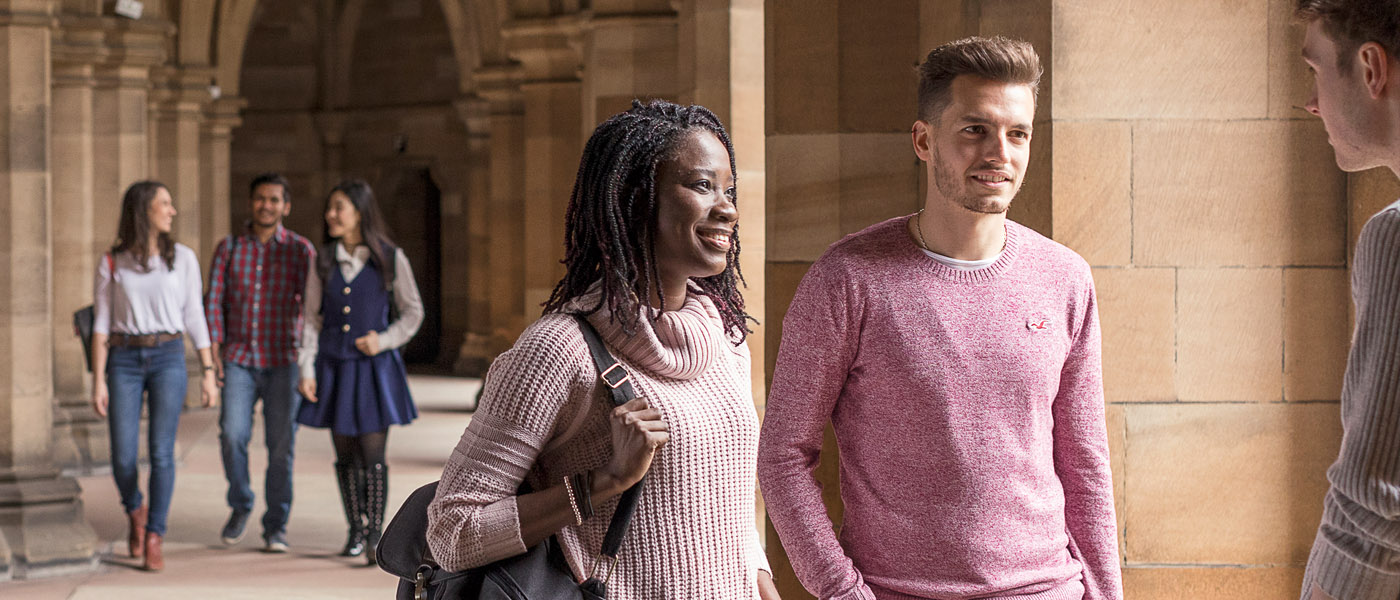
She and her team at Research & Innovation Services have developed guidance to ensure the personal, professional and development workshops they offer researchers are accessible to diverse audiences.
"We want our postgraduate researchers to have the best experience possible at Glasgow. We worked with the PGR community to discuss what makes them feel truly part of the research environment."
Elizabeth wants everyone to feel included in the research community. “We want our postgraduate researchers (PGR) to have the best experience possible at Glasgow,” she explains. “We worked with the PGR community to discuss what makes them feel truly part of the research environment. This helped us design our supervisor development course which embeds thinking about equality, diversity and inclusion at all stages.
“We worked closely with colleagues in the University’s Equality & Diversity Unit, who provide training to staff and students throughout the University community. We tailored our approach and looked at all aspects of the supervisory relationship, providing helpful pointers for supervisors on considerations at recruitment, induction and supporting progress.
“We also shared blogs and quotes from students, as well as some anonymous case studies or scenarios, to raise awareness of challenges which students may face due to their background or characteristics.”
Regular PGR Townhall meetings are organised by the team, to bring the PGR community, supervisors and staff who support PGRs together to share knowledge and ensure greater diversity in the voices that are heard around the PGR experience.
A comprehensive guide to considering equality and diversity issues in organising events and conferences has been created to encourage organisers to think about diversity of speakers, accessibility and creating a welcoming platform for attendees to participate.
Although there is greater awareness of inclusion issues throughout the higher education sector, Elizabeth is keen to progress this work further and will continue to support research staff and students to create a research environment where people are valued and supported to thrive.
Find out more
- Embedding equality, diversity and inclusion in researcher development
- PGR Supervisor training
- Embedding equality, diversity and inclusion into conferences and events
Global perspective
Our extensive international network of people and partnerships enables us to connect and collaborate with leaders across academia, industry and society. In doing so, we develop a truly global understanding of the world’s most pressing problems and grand challenges - and the means and relationships through which we can use knowledge to make a difference.
We are founding members of the networks Universitas 21 and the Guild of European Research Intensive Universities. We have flourishing international partnerships with many prestigious universities and we work with hundreds of partners around the world to deliver study abroad and exchange programmes.
Engaging with the University of Sydney
Professor Clare McManus is our Dean for Global Engagement (South-east Asia & Australasia). The strategic partnership between UofG and the University of Sydney is an example of successful international collaboration.
"We have had considerable success in developing research and teaching partnerships with universities in South-east Asia and Australasia," explains Clare. "Historically, most of this engagement has been through face-to-face activities when we have welcomed our partners to Glasgow; or when our researchers, staff and students have travelled to the region to engage in research and teaching and exchange of best practice.
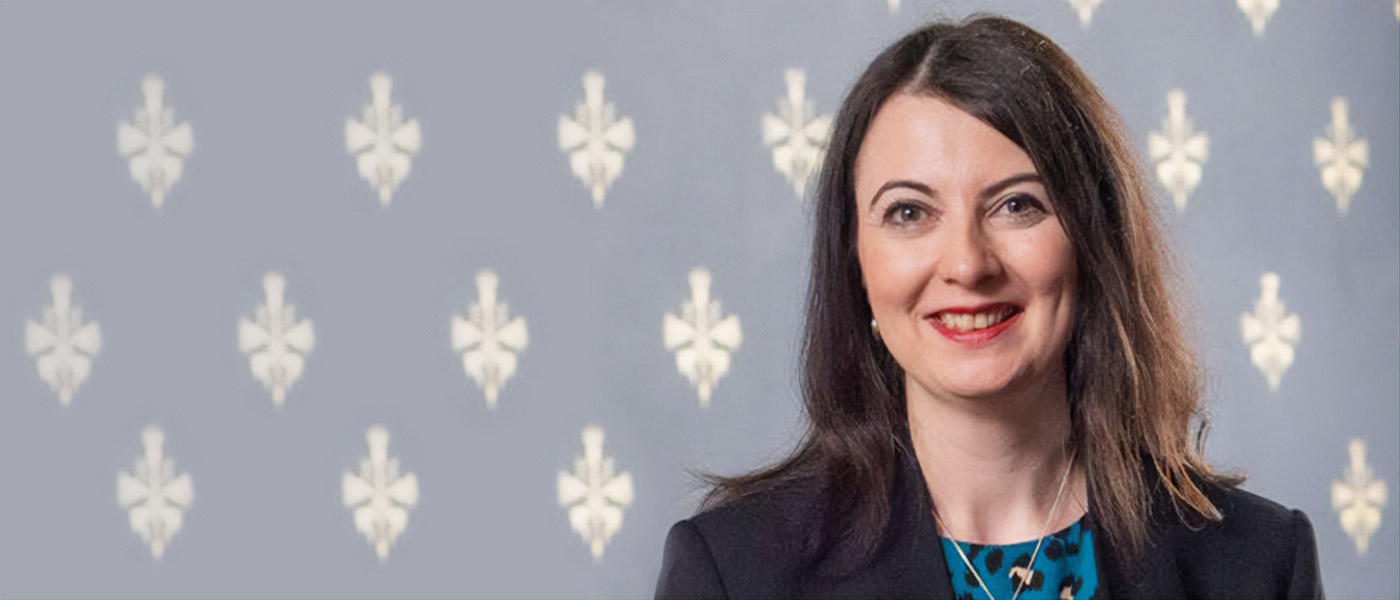
"The COVID-19 pandemic has led us to modify our approach to internationalisation. We have moved many of our international activities online in order to continue to fulfil our core mission to undertake world-leading research and teaching. And we have done this in collaboration with our global partners as part of our commitment to improve societies and address major world challenges, including the current pandemic, during these difficult times."
In September 2020, Glasgow and Sydney held a Joint Virtual Workshop which highlighted some of the exciting collaborations, and discussed ways to create and develop new connections and access opportunities for external funding.
Clare highlights the strategic partnership between UofG and the University of Sydney as an example of successful international collaboration.
"Our strong commitment to international engagement is exemplified by the strategic partnership which we have with the University of Sydney (USyd). It is governed by a Memorandum of Understanding signed in 2016 in which both universities have committed to work closely to develop a range of joint teaching and research opportunities. Together we run a Partnership Collaboration Award to support research and other collaborative activities between Glasgow and Sydney with both universities allocating funding annually to support joint projects.
One of the projects highlighted was 'Exploring Mars Atom by Atom' led by Professor Martin Lee (Head of School of Geographical & Earth Sciences, UofG) and Professor Julie Cairney (School of Aerospace, Mechanical and Mechatronic Engineering, USyd). This project will develop globally recognised capability in the atomic scale analysis of extra-terrestrial materials obtained by robotic missions to Mars, the Moon and passing asteroids; and will enable Glasgow and Sydney to lead international efforts to analyse these unique and exciting samples.
A further virtual event was organised by Glasgow and Sydney in November 2020 and this time the Indian Institute of Science Education and Research (IISER) Pune was also invited to take part. IISER Pune is Glasgow’s strategic partner in India. During this webinar, staff and students from these three higher education institutions spoke about their experiences of engaging in online learning and teaching during the Covid pandemic.
Furthermore, we are planning a symposium to bring together our experts in cardiovascular disease (causes, prevention, diagnosis and treatment). This will expand our existing collaborations in this area and will also showcase the work of our early career researchers. Moreover, our business schools (Adam Smith Business School and the University of Sydney Business School) are forming a strategic partnership and will be developing a series of joint teaching and research activities over the next few years.
There are plans for more events to facilitate meaningful virtual engagement for staff and students from across all disciplines at our two universities.
Find out more
- Our partnership with the University of Sydney
- Our international partnerships and networks
Strengthening our links with Africa
We have strong links with Africa, and over the last few years have also enjoyed a close relationship with the African Research Universities Alliance (ARUA) network. Through our membership of the Guild of European Research-Intensive Universities (the Guild), Glasgow has also been in a strong position to influence a recent joint publication by both networks on a new approach to strengthening Africa’s research, innovation and higher education capacity.
The statement calls for sustainable investment in African knowledge societies by creating Centres of Excellence to confront common challenges for both continents as identified by the African Union and the European Union, such as public health; the Green Deal, the Blue Economy and energy transitions; digital transformations; good governance, peace and security; and migration, mobility and overcoming discrimination.
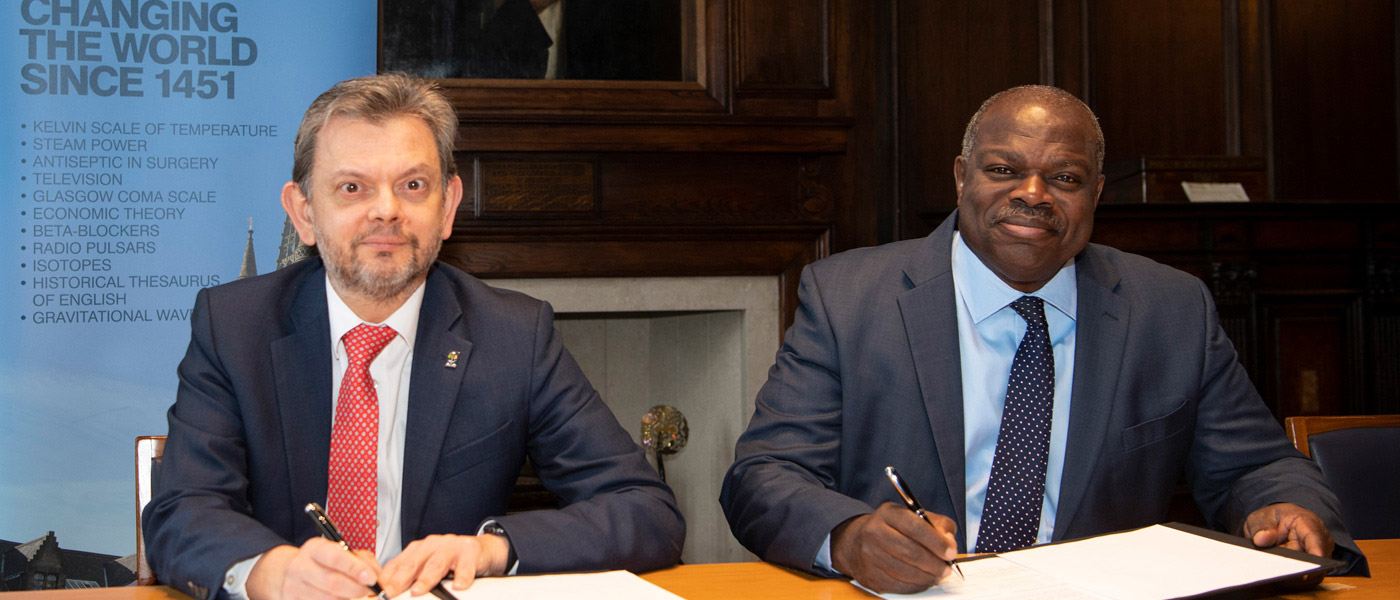
Capacity strengthening in Africa is an issue that the University is keenly invested in, and in 2020 we hosted a symposium on capacity strengthening in Africa, with key contributions from ARUA as well as other Scottish universities, government bodies, funders and partner countries.
Transforming Africa through research and innovation will require strong and effective partnerships.
The symposium provided an opportunity to showcase some of the fantastic work that we’re leading on and to explore what more can be done in this area.
Professor Paul Garside, Dean of Global Engagement for the Middle East and Africa, and colleagues who are leading on the University’s extensive work in Africa saw the event as an opportunity for meaningful discussion about the key components of capacity building and hearing from the perspectives of key representatives from African universities.
During the symposium, a Memorandum of Understanding was also signed by our Principal, Professor Sir Anton Muscatelli, and Professor Ernest Aryeetey, Secretary General of ARUA (image above).
Vice-Principal for External Relations, Rachel Sandison became a Guild board member in June 2020: "I think this is a really important time for Glasgow to lead the conversation in terms of what the key priorities and obstacles are for capacity strengthening, how higher education providers, networks, governments and funders play a role in that, and what the scope is for knowledge exchange and capacity strengthening: not only in terms of academic work but also in professional areas within higher education provision."
Find out more
THE summit comes to Glasgow
The Times Higher Education Leadership & Management summit is coming to Glasgow in October 2021.
The summit, entitled “Recover, Reset, Rebuild. The road to recovery: Leading the transformation of higher education”, will look at the vital role universities will play in the wake of the pandemic, as our societies, economies and communities are rebuilt.

It will challenge current university leadership practices and explore
- the future economic sustainability of higher education
- how leaders and their management structures can rebuild for future success
- civic leadership and the role of universities in international diplomacy
- reputation and the rise of internationalisation of higher education
- universities and sustainable communities: leading the green agenda
- digital leadership and the transformation of online education
- leading a culture of diversity and inclusion.
"This will be the second time we have hosted a Times Higher Education Summit,” says Rachel Sandison, Vice Principal, External Relations, “and I am delighted that we will provide a home for such a critical thought-leadership event in our sector. We have experienced one of our most challenging years, but I am incredibly proud of the tenacity and innovation that our fantastic TeamUofG expert community has shown throughout the pandemic. Being able to bring that to the fore in our event programme along with esteemed colleagues across the sector in the lead-up to COP26 is something I am very much looking forward to."
"THE could not be more pleased to be holding the event, the third in the annual series, with the University of Glasgow, an institution involved in world-changing research for over five centuries." Phil Baty, THE
“Global higher education is facing the most challenging, the most searching test of leadership for a generation," says Phil Baty, Chief Knowledge Officer at THE. "Some initial responses to the pandemic have been truly inspirational, showing universities at their very, very best: dynamic, responsive, collegial, collaborative and indeed, world changing. But perhaps the biggest leadership challenges are still to come. University leaders have to protect the viability and sustainability of our great seats of learning and research to ensure they can play their vital, central role in supporting the world not just through a health crisis, but through geopolitical, economic and social crises too.
“THE’s Leadership and Management Summit is one of THE’s flagship international events, bringing together university leaders from across the world. THE could not be more pleased to be holding the event, the third in the annual series, with the University of Glasgow, an institution involved in world-changing research for over five centuries. It is particularly exciting that the event will take place in the great city of Glasgow, just days before world leaders gather for the UN Climate Change conference, COP26, where universities have a fantastic opportunity to demonstrate that they are an essential part of the world’s shared mission to avert a climate catastrophe.”
World-class research
Our researchers are drawn from the best of global academia, with our disciplinary areas benefiting from internationally recognised experts in their fields. Whether working side by side or as part of large-scale multinational efforts, our teams explore the very edges of human knowledge and understanding - and bring world-changing discoveries within reach.
We have more than 2,500 active researchers and an annual research income of £180m. Our six crossdisciplinary research beacons bring together our ambitious researchers to address the complex challenges which face our world.
Working towards eradicating rabies
Professor Katie Hampson and her colleagues at the Institute of Biodiversity, Animal Health & Comparative Medicine are leading research to eradicate rabies in low and middle-income countries.
Her research team have generated critical evidence that has played a key role in persuading international agencies to advocate for the global elimination of rabies deaths by 2030.
Working towards eradicating rabies video
The research team are also generating detailed estimates of the global burden of rabies and informing prevention, control and elimination strategies.
The team have been recognised for influencing policy on a global level, with their research contributing to the World Health Organization’s recognition that it is now feasible to eliminate global canine rabies.
Most recently, this research has been central to the development of World Health Organization protocols for verification of freedom from disease through mass vaccination of domestic dogs and influential in shaping policy on human post-exposure prophylaxis (PEP) needed to prevent the onset of this fatal disease in people bitten by rabid dogs.
As the science lead of the WHO Rabies Modeling Consortium, Professor Hampson’s work was instrumental in informing the latest WHO position paper (2018) that now recommends a shorter simplified 1-week PEP regimen that is more practical and affordable for patients. These recommendations guided Gavi, the Vaccine Alliance, in their decision to invest in life-saving human post-exposure vaccines in their 2021-2025 strategy.
Previously, Professor Hampson led a large consortium to estimate the global burden of canine rabies, bringing together a large number of contributors from many rabies endemic countries. The resulting publication in the Lancet (cited over 600 times) is widely used by advocates of rabies elimination. The team have collectively advised the WHO, the Food and Agriculture Organization of the UN and the Pan-American Health Organization, as well as national governments on large-scale rabies surveillance and control programmes including countries such as Tanzania, Kenya, Philippines, Indonesia, Vietnam, Mexico, Brazil, Ecuador and South Africa.
This work involves training, mentorship and support of scientists including graduate students and early-career scientists in Africa, Asia and Latin America. Research led by these scientists has included a range of collaborations with national governments on the implementation and evaluation of approaches to rabies control and prevention, and demonstrates the valuable synergistic benefits of analysis and modelling carried out in parallel with interventions.
These diverse and long-standing collaborations with major global animal and public health agencies constitute a remarkable example of the relationship between research and policy development between the academic and non-academic partners. The quality, creativity and innovation of this research is recognised through sequential Wellcome Trust Fellowships and numerous other competitively acquired research awards.
Find out more
Precise bowel cancer screening
The University is leading on a £3.3m project to transform bowel cancer screening in the UK. The Glasgow team, in collaboration with the NHS and Scottish tech companies, will develop a precision diagnostic tool that uses artificial intelligence to predict which patients will develop future polyps and tumours.
The project will improve cancer detection while reducing the number of people needing repeated colonoscopy, a procedure patients find unpleasant and which also carries a risk of complications. It will also improve access to colonoscopy for others and reduce costs to the NHS.

Bowel cancer screening is used to find tumours and pre-cancerous lesions, or polyps, in patients without symptoms. The aim of screening is both to identify cancers early, making them easier to treat successfully, and if possible to remove them while they are still polyps.
"By better predicting the needs of individuals, we can help patients avoid procedures that do not benefit them, while reducing the burden and cost to the NHS."
Professor Joanne Edwards
In Scotland, adults at an appropriate age are invited to submit a stool sample by post and, if traces of blood are detected, they are invited to have a colonoscopy, which is a more detailed test. At colonoscopy, around one in 20 people are found to have cancer, while one in three have polyps. Around half of these patients will go on to develop new polyps, so all are currently scheduled for a future colonoscopy.
Current guidelines help clinicians decide when each patient needs a further colonoscopy. However, these guidelines are not accurate, meaning that many people undergo unnecessary and invasive procedures. The new precision tool will identify patients who would benefit the most from colonoscopy, so they are seen earlier and any cancer can be treated sooner.
The team will combine polyp tissue and data from the NHS Greater Glasgow & Clyde Scottish Bowel Cancer Screening Programme to train algorithms that predict patients’ future risk. Researchers will combine information about specific changes in the polyp’s structure, seen under the microscope and analysed using deep learning, with new analysis of the genetic mutations that cause polyps to grow.
Professor Joanne Edwards, Professor of Translational Cancer Pathology at the University’s Institute of Cancer Sciences, says, “UofG has wide experience in all aspects of colon cancer. By combining our knowledge with industry partners and the NHS, we can harness the power of artificial intelligence to assess which patients are prone to polyps and need further colonoscopies.”
Find out more
Chronicling 1,000 years of the English language
Researchers at Glasgow recently launched the second edition of a unique, world-class and award-winning resource that charts the development of the English language over the last millennium, the Historical Thesaurus of English.
Led by Professor Marc Alexander of the School of Critical Studies, it took more than 230 researchers almost half a century to compile the thesaurus, the world's first and still the largest. It has transformed teaching, learning and research at Glasgow and was awarded the prestigious Queen’s Anniversary Prize in 2017, the highest accolade available to any academic institution.
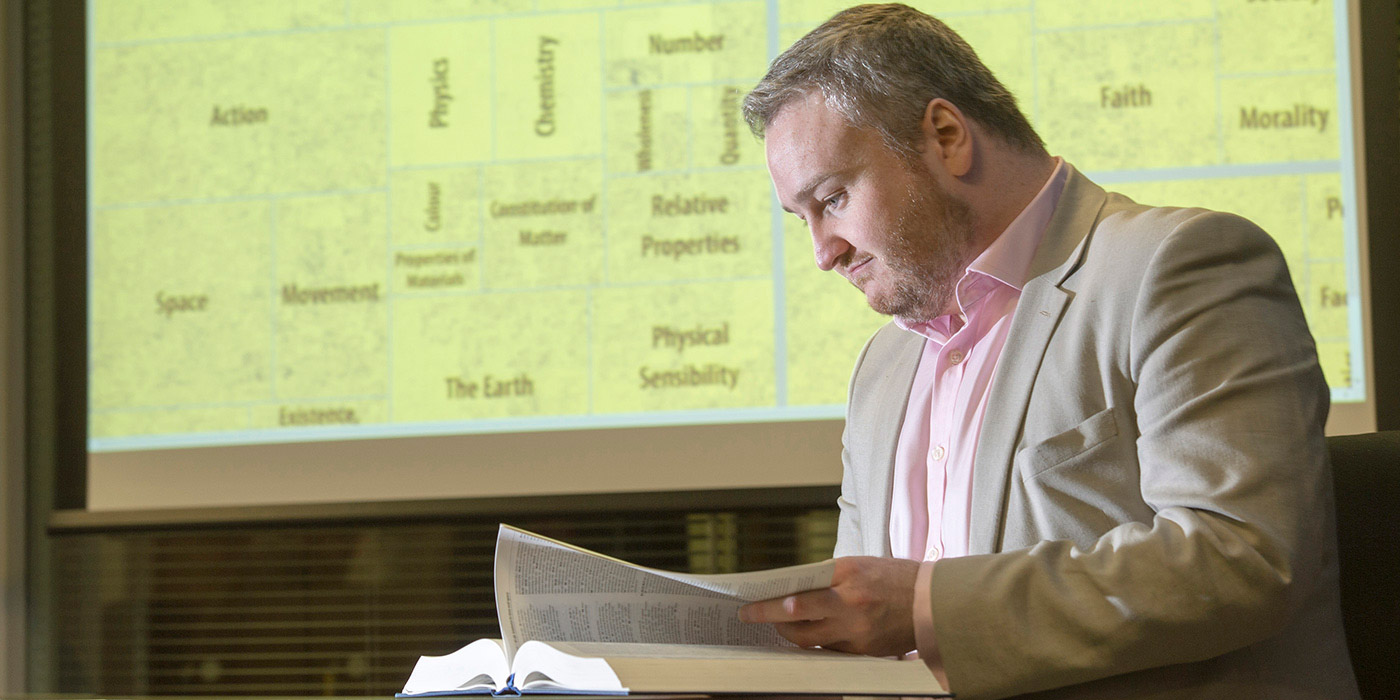
"Since it’s been published it’s brought in more in research grants to Glasgow alone than it cost to make over 40-plus years, so it really is a landmark humanities project. It’s transformed research in Glasgow; it's transformed research around the world." Professor Marc Alexander
Beginning in 1965, early work on the project involving writing index cards by hand, recording the semantic development of every English word from Anglo-Saxon times to the present day in a detailed history that, for any given period since 1150, can provide the words used to express a particular concept or object. The project moved from longhand to microfilm to computer databases, embracing advances in digital technology as they became available, and the huge team of linguists working on the project supported three chief editors over half a century of work.
The first, printed edition of the thesaurus was published in 2009 and it was integrated into the online Oxford English Dictionary the following year. It now contains more than 800,000 entries in 235,000 categories, an unrivalled resource which has gained significant international recognition and has been described as “perhaps the single most significant tool ever devised for investigating semantic, social and intellectual history”. The second edition revised 200,000 categories and 160,000 words, including adding new words including 'selfie', 'bro hug', 'SARS' and 'meh'.
Since its publication, royalties from the sale of the thesaurus have been reinvested into the project and used to fund a lecture series, undergraduate prizes and postgraduate scholarships. The recipients of these scholarships have produced work spanning a wide range of topics from mental health representation to economic development in Malawi to medical autobiographies, demonstrating the tangible practical benefits of the thesaurus on society as a whole and ensuring that its impact continues to be felt globally.
As well as being a major resource for linguists, historians and philosophers worldwide, the thesaurus is used constantly in teaching here at Glasgow, and not just in courses on English historical linguistics, but also in history, computing, creative writing, digital humanities and natural language processing.
Find out more
Lasting impact
Our discoveries are only the starting point. Through innovative partnerships with industry, policy engagements with governments and our role as a regional civic anchor, we work to transform our ideas into action, using our skills to make a difference in everything from local problems to the global grand challenges of our age - changing the world at every scale.
The University of Glasgow was founded for the benefit of the city and its people. We work with companies and organisations throughout the city to co-design solutions to create real, lasting impact and opportunity in Glasgow and beyond. Our staff and students are engaged in strong, enduring research and community partnerships to improve health, boost the economy, build a better future and celebrate the achievements of those living in Glasgow.
Community engagement is child’s play
Baltic Street Adventure Playground in the heart of Dalmarnock, an area of high deprivation, is providing a lifeline for local families, giving children a safe place to play and providing hot, healthy meals, which is invaluable for families living on tight budgets.
Established in the wake of the 2014 Commonwealth Games as a child-led supervised adventure playground, it has grown to become an important community resource.

Feeding the children who attend the playground has become a core aspect of supporting local families. Fresh produce is grown in the community garden space, tended by the children with the help of community growers. Researchers from the Adam Smith Business School are working to support and develop the sustainability of this community food hub.
Dr Helen Traill is part of the research team with expertise in collaborative and community-led approaches to community food, along with colleagues Dr Stephanie Anderson and Professors Deirdre Shaw, Andrew Cumbers and Robert McMaster. Thanks to European Union/Scottish Government Social Innovation funding, the team has been able to work alongside the playground to expand the community food hub to support the families and residents of Dalmarnock and surrounding areas.
“From a research perspective," explains Helen, "working in partnership with the playground has been essential to enable us to engage with the local community to gain an understanding of how they feel about community food and sustainability and to understand how to encourage people to take part in cookery sessions or growing.”
The project won the 'Making a Difference' award at the Scottish Knowledge Exchange Awards in February 2020.
More generally, the playground has been invaluable in assisting the local community to overcome the problems associated with living in a ‘food desert’. This means that, without access to a vehicle, people would have to walk at least 20 minutes to reach the nearest shop. However, with funding from the project to provide a minibus, they are now able to support the mobility of local people and facilitate local deliveries of fresh food. The playground plans to start a buddying scheme, whereby the children will assist the elder community with their shopping.
Further developing this goal of improving intergenerational relationships, the children take freshly prepared, nutritious food to older residents who are house-bound or struggle to leave their homes. Some of this food is gathered fresh from the garden, while the majority of it is received from FareShare, a food redistribution charity. The impressive food storeroom is stacked with fresh produce, non-perishables and root vegetables. Local community members are free to visit during opening hours and take what they need, creating a truly open community resource.
Thanks to the mutually beneficial relationship that has developed between the University and the playground, Helen and the rest of the team have managed to gain rich data from their qualitative research, which will be used to inform future interventions and has the potential to influence policy decision-making.
Find out more
On a mission to promote good health
A University spinout company based at our Clinical Innovation Zone (CIZ) has been developing promising new therapies for people with common but costly musculoskeletal problems.
Causeway Therapeutics was founded by Drs Derek Gilchrist and Neal Millar of the Institute of Infection, Immunity & Inflammation, and they have developed their lead product, TenoMiR, as a therapy for tendon injuries and disorders known as tendinopathies.

Causeway relocated to the ClZ at the Queen Elizabeth University Hospital in 2017 after receiving £2m investment from biotech investment company Mediqventure and the Scottish Investment Bank. "A major incentive for our move to CIZ,” says Dr Gilchrist, “was that working alongside other life science and drug development companies provides a great environment for collaboration and the exchange of ideas.” The team are keen to share their experiences and learn from the growing innovation community within CIZ.
"Our decision to locate to CIZ was an easy one to make. The proximity of CIZ to the hospital, our lab at the University and the Imaging Centre of Excellence building's state-of-the-art 7T MRI, is a perfect fit for TenoMiR's clinical development. Dr Derek Gilchrist, Causeway Therapeutics
The CIZ is a key node of the Glasgow Riverside Innovation District and provides 22,000 square feet of high-specification units designed to foster open innovation. It gives access to world-leading clinical academics, outstanding clinical research facilities, and industry partners, and is also home to an ultra-high-resolution 7 Tesla MRI scanner: the first of its kind to be fully integrated within a clinical site in the UK.
However, it isn’t just about the facilities, it’s about the connections and the networks which the space enables. The building is designed to provide opportunities and spaces for like-minded people to connect and collaborate.
Tendinopathies are extremely common, accounting for between 30 and 50% of all sporting injuries, and cost the NHS £250m per year, often with satisfactory results in only half of cases. “Tendinopathy represents a serious unmet clinical need,” says Dr Millar, “and we hope our discovery will one day transform patient care in this field.” TenoMiR has the potential to transform patient treatment and is currently in clinical trials supported by £2.5m of Innovate UK funding.
Find out more
Helping schools reach their potential
A strong link exists between a pupil’s socioeconomic status and how well they do in school. Children living in deprived communities and lower-income households generally do significantly worse at all levels of the education system than those from more affluent areas. This is known as the attainment gap.
Researchers at the University’s Robert Owen Centre for Education Change developed the Network for Social & Education Equity (NSEE), an innovative model designed to support schools work together to make significant changes to help all children in Scotland and internationally to reach their full potential.

"Tackling educational inequity is the defining challenge of our time. Professor Chris Chapman
The Network facilitates school-to-school partnerships which are established and moderated to develop and embed evidence-based strategies. These strategies are designed to tackle education inequality and spark sustainable change.
Teachers are encouraged to work with colleagues within their own school and with partner schools, to allow educators to share effective strategies with others.
Professor Chris Chapman, who leads the NSEE team, is also a member of the First Minister’s International Council of Education Advisers and is Senior Academic Adviser to the Scottish Attainment Challenge. He is also President of the International Congress for School Effectiveness and Improvement. “NSEE is about using the existing knowledge, expertise and ideas that exist within schools and combining them with research evidence and collaborative action research to enhance learning and teaching, and impact on student outcomes. Collaboration and networking are used to move the knowledge and practices across classrooms, schools and local authorities. Tackling educational inequity is the defining challenge of our time and the COVID-19 pandemic has bought it into even sharper focus.”
Find out more
Outstanding teaching
Our internationally renowned degree programmes are shaped by our rich, dynamic research environment which connects learning with global challenges. Adopting evidence-based approaches that are supported by world-class physical and digital learning environments, we work in partnership with our students to co-create knowledge and to develop the next generation of global thinkers and leaders - creating a living legacy of future world changers.
We ranked second in the Russell Group for teaching in the National Student Survey 2020 and hold joint 18th place in the 2019 European Teaching Rankings. We have one of the widest ranges of programmes in the UK and are extending our global footprint through innovative transnational education.
JMS Learning Hub, the heart of our campus
The James McCune Smith Learning Hub will be a state-of-the-art learning and teaching facility right at the heart of the main campus.
Students will benefit from new facilities such as Technology-Enhanced Active Learning (TEAL) rooms, with screens, projectors and enhanced connectivity for devices; all of which make sharing information easier and mean students and teachers can collaborate in the learning and teaching process.

Many rooms are also designed to be easily reconfigurable, supporting different types of teaching activities, and making the learning experience more immersive.
As well as 1,300 teaching spaces, there are around 1,200 spaces for private or group study, equipped with charging points and access to high speed wifi. And, of course, the building has been designed with accessibility at its heart, so all students can access it regardless of physical access requirements.
"I am confident that the University has built a landmark facility, one that will make a real difference to our students’ lives and boost the University’s profile as a global leader, delivering learning and teaching excellence,” says Professor Frank Coton, Vice-Principal Academic Planning & Technological Innovation.
"The James McCune Smith Learning Hub has provided a fantastic opportunity to work with students and staff in designing spaces that support a real evolution in our approach to teaching," says Professor Moira Fischbacher-Smith, Vice-Principal for Learning & Teaching. "It will allow us to better support our students to participate in active learning within collaborative environments, using technology to support engaging learning opportunities.
"We have conducted various pilots and trials to inform how this building will operate, and it will be exciting to see students finally using the building, putting their stamp onto it and continuing to work in partnership with staff to shape and evaluate our changes in teaching in the University."
This building isn’t just about technology; the vision behind the project was to promote accessibility and equality, allowing more people to benefit from a University education, regardless of individual needs or circumstances.
This is reflected in the decision to name the building after James McCune Smith, the first African American to earn a medical degree, graduating from the University of Glasgow in 1837. The figure of McCune Smith represents how this building will provide opportunities to engage more people in a university education, widening access those who may not have considered higher education before, or for whom it was not a realistic prospect.
"The opening of the James McCune Smith Learning Hub will be a landmark for the student experience at Glasgow", says Liam Brady, President of the Students’ Representative Council (SRC). "Not only will it create space, alleviating some of the pressure on existing study spaces, it will remove barriers faced by students with additional requirements, such as around accessibility, for whom historic buildings and campuses are barriers to a university education.
"I’m pleased that other areas of accessibility, such as extending opening hours to accommodate those for whom studying during core hours may not be possible, such as people with work, family or caring commitments, have also been considered in the design and operation of the building."
Find out more
Transforming teaching virtually
We are revolutionising students’ learning experience by enabling teaching to take place in virtual environments.
Our students will soon be able to explore and learn in virtual reality (VR) classrooms. The Centre for the Study of Perceptual Experience has invested in Virtual Reality & Augmented Reality technology, an Innovate UK-funded project costing almost £1m.
UofG Principal Tests Out New Virtual Reality Teaching Tools
The centre’s Professor Fiona Macpherson and Dr Neil McDonnell have collaborated with Sublime, a leading Scottish immersive technology company, to create a VR classroom that will transform the way students learn. “Using 3D environments in teaching can be extraordinarily powerful,” says Dr McDonnell, “whether those environments are accessed via VR headsets, Zoom or a laptop screen.”
"I can see great potential to enhance the remote teaching experience for those studying subject areas covered by this pilot, allowing access to VR technology and recreating the experience of being together in a lab or classroom without the need for specialist hardware. Professor Sir Anton Muscatelli
The platform that will be used to access these environments, Edify, has been developed to allow students to benefit from VR teaching wherever they are in the world, without the need for specialised hardware. Students studying an array of topics such as history, physics and anatomy will be able to dial in to a virtual learning environment, whether that be a 3D lab, classroom or lecture, using popular communications tools like Zoom and Microsoft Teams. Edify is piloting ten apps, which cover all four colleges, and include a 3D model of the heart, a tour of the stomach, a virtual geological tour of Arran and a replica disease diagnostics laboratory.
The new advances and our investment in VRAR technology, which will be clearly demonstrated in our landmark James McCune Smith Learning Hub, will directly address accessibility and physical remoteness issues while also paving a path for future learning opportunities to be explored. It’s more crucial than ever that HE institutions adapt their teaching methods to the new reality of remote working and learning.
Both the University and Sublime believe that Edify will transform the teaching environment and provide vital accessibility to shared learning experiences.
Find out more
Teaching awards to those who go above and beyond
Every year the Students' Representative Council (SRC) hosts the Student Teaching Awards to recognise the outstanding work of those who have gone above and beyond to make our students’ time at Glasgow the best it can possibly be.
In June 2020, Dr Heather Cleland Woods of the School of Psychology was named winner of the Outstanding Contribution to Teaching award at the virtual ceremony.
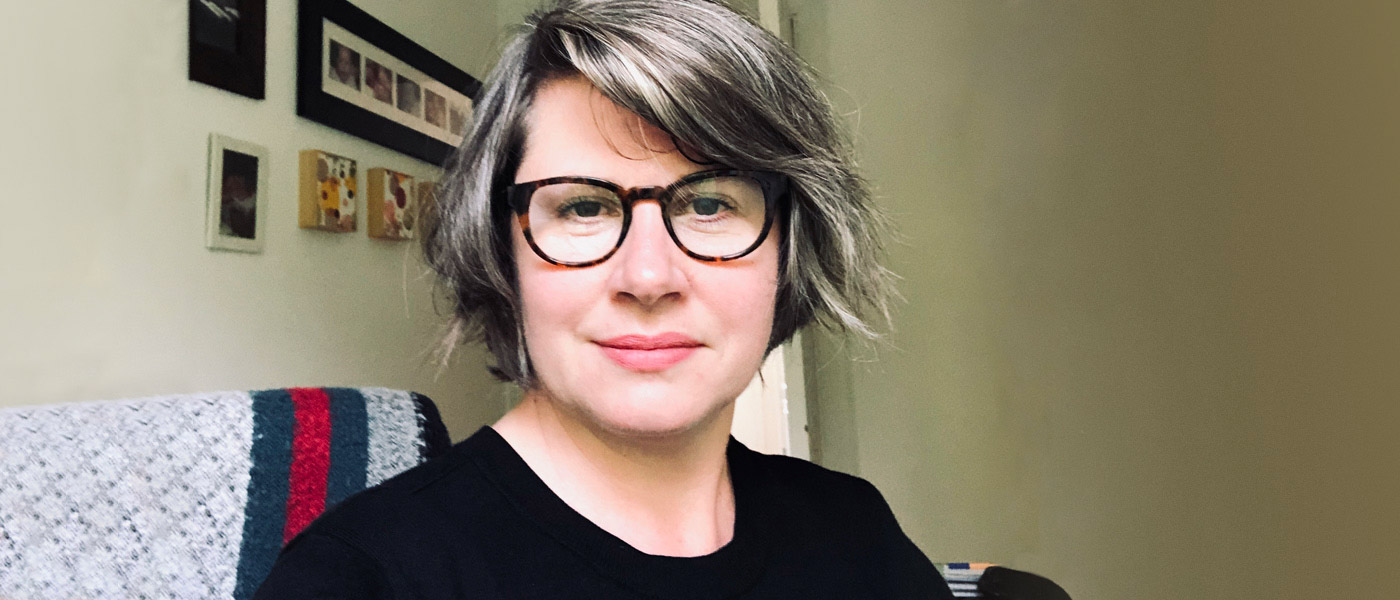
The Student Teaching Awards are the students' chance to recognise the outstanding work of those who have helped them.
“When the students recognise you for doing your job, that really is a big deal,” she says. “And I’ve been amazed at the resilience they’ve shown just to keep on going in the current situation.”
Accelerated by working during lockdown, using new and innovative technologies in her teaching is something that has been brought sharply into focus over the past few years.
“Four or five years ago, we began to move towards embedding more technology into our everyday teaching practice,” she says, “using things like the Moodle virtual learning environment and electronic submissions. We have a very large and diverse student body, and many of our students are also carers, or having to work to support themselves, so we wanted to create an inclusive online environment so that students could access what they needed, when they needed it.
“2020 took us forward even more in terms of technology, and we’ve modified our practice in ways we weren’t expecting, getting on board with Microsoft Teams, for instance, which we’ve picked up quickly and adapted for a student body that is now all over the world, in different time zones. We’ve also been part of the working group developing some of the spaces and technologies in the James McCune Smith Learning Hub.”
With a first-year cohort of 660 students, and lectures being repeated twice a day when still on campus, it would be easy for personal attention to students to be lost. “But I’ve always made it clear,” says Dr Cleland Woods, “that my virtual office door is still very much open if a student wants to talk. We want to find ways of facilitating conversations.
“This year has been testing, when we all had to pick up our computers, walk out, plug them in at home and keep going, and we’ve had to learn so many new skills and face so many new scenarios, but as a school, as a team, we’ve risen to the challenge.”
Find out more
Life-changing experiences
Our graduates get more than a degree. We curate an enriching world of social events, sport, volunteering, internships, international experiences and more in which students can connect, develop new skills and enhance their prospects. More importantly, we give them the space, time and guidance to forge their own path - and take their first steps as future world changers.
We give more than just a degree. Our students are equipped with the academic abilities, personal qualities and transferable skills that offer bigger opportunities in the future. We provide students with the chance to develop effective communication skills and confidence, and become independent and critical thinkers who are ethically and socially aware.
More than just a degree
Comfort Kyeremeh was one of the first students to graduate from our pioneering programme in Global Mental Health in 2018. She left with more than just a degree. Taking part in extracurricular activities such as the College of Medical, Veterinary & Life Sciences’ Graduate Skills Award initiative equipped Comfort with the attributes she believes has helped secure her dream job.
"My lecturers were very proactive," says Comfort. "They encouraged us to take part in different kinds of initiative away from our studies such as the Graduate Skills programme, which supports postgraduate students to do voluntary work and build up transferable skills.

"I felt I was being given an opportunity to develop myself and I really enjoyed that aspect. You choose three main areas you want to develop, such as personal skills, professional skills or social skills, and submit evidence and reflective pieces about the types of activities you did to progress these.
"I had such an amazing time studying at UofG because there was so much on offer when it comes to personal development and professional development. The staff are always willing to support you in whatever you want to do to advance your academic and professional life and opportunities."
"As part of the programme, I volunteered with Student Action for Refugees and also with Glasgow University Positive Minds Society, which gives peer support to students who may have mental health challenges. I wanted to know more about how students are able to balance all their academic responsibilities with having good mental health, on top of all the stresses they have. The University also organised placements to strengthen our transferable skills, I took some online research skills tutorials, and we were encouraged to do our dissertation research anywhere we felt we wanted to.
"I signed up for the Network, and also used the Careers Service for CV checking and interview prep tips. I still get regular emails from them now, wondering how I'm doing after finishing uni, so that's a good way to make you feel supported. They were very good in in giving advice and tips about searching for jobs in places I didn’t even know about."
Find out more
- Careers Service
- Student Alumni Network
Three global partners; one incredible experience
We aim to equip our students with an education and skillset that is valued internationally. Our Master of Global Business, launched in 2020, encapsulates this international perspective by providing a truly global learning experience at three leading business schools across three continents (Europe, North America and South-east Asia).
For the University of Glasgow, the Master of Global Business is an opportunity to deliver a new model of mobility: a tripartite postgraduate masters exchange. The programme is delivered alongside our partners: University of Victoria, Canada and Chulalongkorn University, Thailand. This close collaboration offers students from all three universities the chance to gain global business insights.

Dr Ramona Blanes is the academic lead for Glasgow: "The programme enables the students to move with their cohort to three different continents, assimilate themselves in three cultures and learn about business management in Asia, Europe and North America," she says.
The courses are specifically designed to highlight to the students the similarities and differences in management styles and thinking, and the regulations in the countries.
Master of Global Business study begins at the home university. Then the international experience begins, with mobility taking place in each country: starting with study in the Peter B Gustavson School of Business (Victoria); followed by time at our Adam Smith Business School; and ending at the Chulalongkorn Business School (Bangkok). Finally, the students return to their home university to finish their studies.
As a global cohort, the students study in three diverse, international business environments. World-leading experts from each partner deliver a curriculum that includes business fundamentals, global leadership, cross-cultural intelligence, and a chance to learn a new language. In addition to the core courses, students have the choice to complete an international internship or undertake a thesis research project.
The benefits to the students are obvious, discovering how business is done in an international environment will help future careers. Living, working and studying in three countries equips the students with a high level of cultural awareness and cross-cultural communication that increases effectiveness in international contexts.
In this model, all three partners offer this innovative degree. It is a new dynamic model of delivery that Glasgow is delighted to deliver.
Find out more
Improving digital inclusion In Glasgow
DigiGallus Connect is a UofG student-led project which addresses COVID-19-related isolation and loneliness in the over 50s through improving digital connectedness.
The project was established by students at the Adam Smith Business School in response to the pandemic, with the aim of assisting vulnerable and older people, specifically within the over 50s population, who have limited access to internet and digital services.
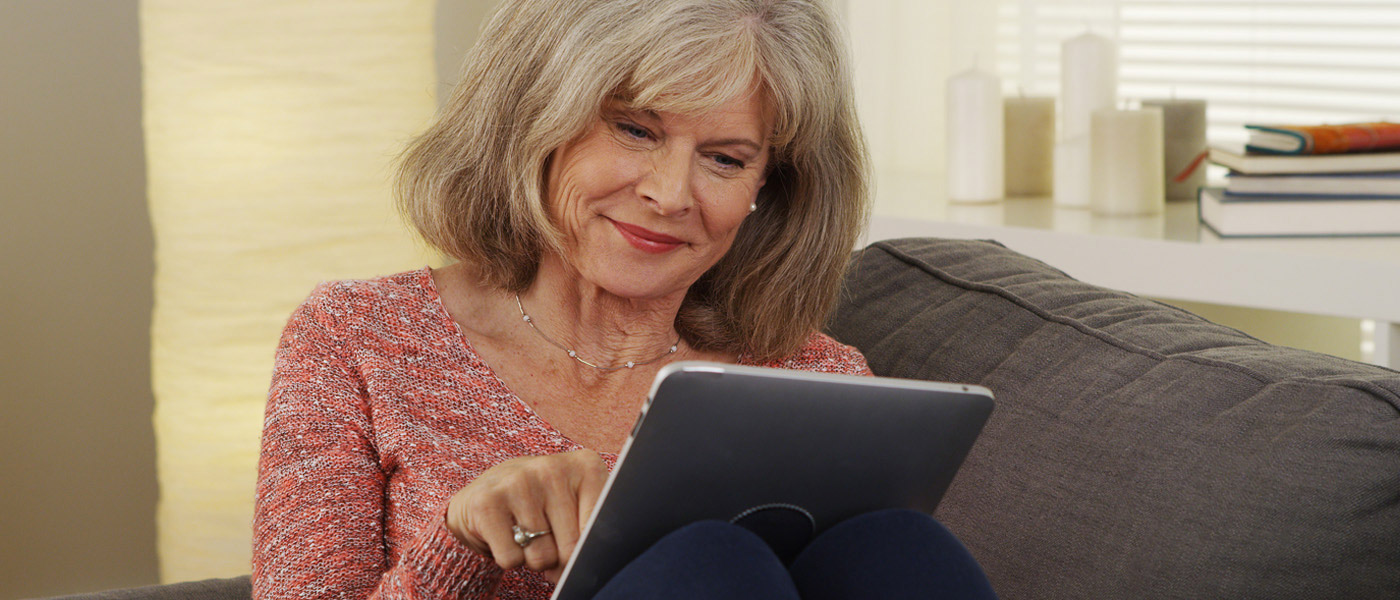
DigiGallus Connect promotes digital inclusion in the community through the power of intergenerational relations.
Being digitally excluded can exacerbate social and economic exclusion. Digital inclusion rates tend to be the lowest amongst the elderly population with over half of non-internet users being over the age of 75 and 49% of non-internet users being classified as some of the most deprived in society, according to the Good Things Foundation.
The pandemic has fundamentally shifted our way of interacting with one another, with the vast majority of social interactions going virtual. Students at the Adam Smith Business School, aware that COVID-19 had the potential to increase isolation and loneliness among older people in Glasgow, were keen to use their skills and knowledge to help address this. The challenge would also give them the opportunity to develop their skills and gain experience of intergenerational communication and collaboration.
The initiative aims to establish 100 mentee-mentor relationships with student volunteers supporting their member of the community in learning how to send emails, make online video calls, use social media and ensure safe online browsing.
"As part of the University’s commitment to help close the digital divide in the city of Glasgow, the student run DigiGallus Connect project will distribute internet-connected devices to the over 50s, with students providing a digital literacy programme and free technology training to those that most need it, an example of one generation supporting another," says Des McNulty, Assistant Vice-Principal, Economic Development & Civic Engagement.
The initiative recently received a grant from the Robertson Trust to support its work, and was a winner at the Imaginative Educator Awards, which recognise exceptional responses to the teaching challenges caused by the COVID-19 pandemic.

